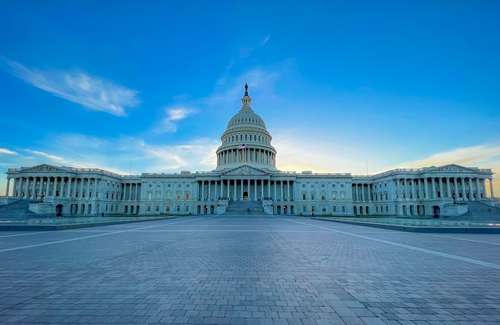GENIUS Act Clears House Vote: Stablecoin Law Could Pass This Week
The latest news in the cryptocurrency world might just send a ripple through the digital finance community. The GENIUS Act has now cleared a key procedural hurdle in the U.S. House, passing with a vote of 215-211. This is a pivotal development that could soon see the stablecoin law on the president’s desk if it passes the next vote. Whether you’re a crypto enthusiast or a casual observer, it might be worth keeping a keen eye on how digital currency regulation evolves in the coming days.
With debates raging on both sides of the aisle and lots of uncertainty about how the final piece of the puzzle will fit together, many are asking: Is this the turning point for establishing a comprehensive legal framework for stablecoins? What will it mean for market regulation, blockchain technology, and the overall financial regulation policy in the U.S.?
Overview of the GENIUS Act
This section dives into what the GENIUS Act is all about. The legislation aims to create clear guidelines for stablecoin providers, establishing a legal and policy framework that delineates the roles of the SEC and CFTC in overseeing digital assets.
The GENIUS Act is not just another piece of cryptocurrency legislation; it’s a robust response to the fragmented regulatory landscape we have seen thus far. In the highly charged world of digital assets, this bill is seen as a beacon that could lead to more structured government action and stable finance practices. With phrases like "comprehensive legal framework" and "market regulation," the act touches on some important issues that many industry experts have been discussing for years.
There is a certain urgency in passing effective legislation, as this could lead to reduced uncertainty for fintech firms and investors alike. Many commentators have noted that the stablecoin law could ultimately bridge the gap between traditional finance and the dynamic world of cryptocurrency, a much-needed step in ensuring legal clarity in a rapidly evolving market.
The bill addresses both consumer protections and market stability, which are vital in today’s fast-moving digital currency space. It even carves out specific roles for regulatory bodies like the SEC and CFTC, ensuring that clauses related to blockchain technology and economic impact are clearly defined. It feels like a significant win for those advocating for thoughtful financial regulation without stifling innovation.
Policy Implications and Future for Stablecoins
This next part sheds light on the policy implications of the GENIUS Act and its potential impact on stablecoins. As the digital currency market continues to grow, regulators are in a race against time to create environments that foster innovation while safeguarding the financial ecosystem.
With the possibility of the law reaching the President’s desk by the end of the week, many in the fintech sector breathe a sigh of relief. The stablecoin law is expected to offer much more certainty to market players by establishing consistent rules for digital assets. It paves the way for safer investment channels and bolsters investor confidence in the space.
Imagine a world where instead of facing a patchwork of uncertain regulations, businesses have clear-cut rules similar to traditional financial systems. That’s the promise of the GENIUS Act—a future where the regulatory landscape is as stable as the coins at its heart. Even if the opposition from some quarters remains strong, the potential benefits of achieving a unified legal framework are undeniable.
Furthermore, analysts have compared this move to other landmark legislations where clear guidelines not only protected investors but also unlocked significant economic opportunities. In this sense, the act has the potential to spark a wave of innovation and growth. Many view the vote as a cautious yet necessary step towards harmonizing financial regulation with emerging market realities.
Political Dynamics and Market Reactions
Political dynamics play a critical role in passing legislation such as the GENIUS Act. The vote of 215-211 illustrates a significant split within the House, with strong partisan divides emerging over the legal framework for digital currency. While the act has garnered support, it notably lacks endorsement from Democratic lawmakers, which leaves the final decision in a state of suspense.
Those in the cryptocurrency community have been both excited and anxious throughout this process. Comments on social media and investment forums reveal a mix of cautious optimism and concern about what the final outcome might mean for the market. Some have even noted, 'This is the wake-up call that the digital asset industry has been waiting for,' suggesting that this legislative push could finally bring much-needed stability to the rapidly shifting environment.
Decisions made in the U.S. Congress have far-reaching effects across the global market. For instance, stablecoins have been pivotal in providing liquidity and a reliable medium of exchange in uncertain economic times. Now, clearer regulatory guidance might mirror similar regulatory harmonies seen in other parts of the world, thus potentially increasing the U.S. market's competitiveness on the international stage.
The mixed reactions from political figures reflect deep-rooted differences over government interference versus market freedom. Although there is evident reluctance from some members of Congress to support substantial government regulation, many industry insiders believe that a stable legal framework will ultimately benefit the entire market by reducing unpredictability and encouraging further innovation.
Challenges Ahead and Looking Forward
The road ahead is not without obstacles. While the GENIUS Act promises a new era of regulatory clarity and economic stability for digital assets, experts warn that there are still many hurdles to clear. The final stages of voting could see last-minute amendments or political maneuvering that might change the act’s trajectory.
What does this mean for stablecoins and the broader cryptocurrency ecosystem? It means that while we can be optimistic about the potential benefits, industry players must remain agile and responsive to ongoing policy updates. The final version of the legislation could very well include tweaks that address additional concerns, ensuring that both investors and innovators are protected.
This dynamic environment calls for continuous monitoring and a readiness to adapt. Like any major regulatory overhaul, implementation will likely be a gradual process—one that could feel a bit like learning a new language. But as the saying goes, change is never easy, and sometimes, a decisive vote in the House is all it takes to spark a revolution in fintech.
There’s a genuine sense of anticipation and excitement in the air, both within the halls of power and across trading desks. It’s like waiting for a storm to pass, knowing that on the other side lies a clearer sky and stronger foundations for digital currency governance.
In summary, the GENIUS Act represents a groundbreaking step towards modernizing financial regulation for the digital age. As we wait to see if this legislation will be signed into law, the conversation around stablecoins and digital assets is only set to intensify. The act’s journey through Congress is a reminder that government action, even when tested by partisan divides, can pave the way for meaningful policy changes. And if this law passes, it could serve as a catalyst for further innovations in the world of blockchain technology and digital finance.




